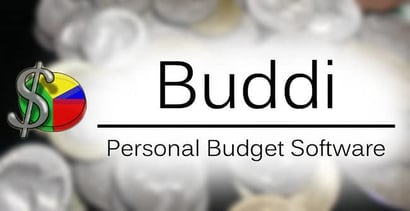

In a nutshell: The Buddi money management program makes it easy to track your expenses, plan budgets for the future and create colorful reports for analyzing trends in your financial habits.
Budgeting probably isn’t one of your favorite activities. Likewise, many people are so turned off by budgeting that they’ll actually pay to have a professional or a computer program organize their personal finances for them.
But if you’re busy and broke, chances are you’re not going to want to budget at all if it means resorting to traditional pen-and-paper methods.
That’s where Buddi comes in, a personal finance program so simple that its creator Wyatt Olson said you’ll be “good to go in less than 15 minutes.” Best of all, Buddi is entirely free — a huge plus for people already struggling with debt.
How Buddi Got Started
2006 was an eventful year for Olson: He was wrapping up the final year of his bachelor’s in computer science and had just been married. As anyone who’s completed university or tied the knot knows, personal finance can get messy during major life milestones like those.
“I was working on a Macintosh at the time, and there were very few options for budgeting on that platform, and none that I could find which were free,” Olson said. “Even the relatively low cost of something like Quicken for Mac was not an option for me at that time — $50 of ramen noodles goes a long way!”
Olson put his skills to work and released a very simple version of Buddi under the GNU General Public License which, long story short, means anyone can freely download and redistribute a piece of software.
Since then, Olson and a community of finance and programming experts have continued to develop Buddi into one of the most comprehensive personal finance programs on the market.
“I feel a debt of gratitude for all the wonderful authors out there who have released their work for the world to benefit from,” he said. “I hope that my open source projects, such as Buddi, can in turn help make the world a better place.”
Tools to Track Your Accounts and Create Budgets
Once you install Buddi, your next step is to set up all of your accounts, including both your assets (things like cash, checking, investments and savings) and your liabilities like credit cards, loans and similar debt accounts.
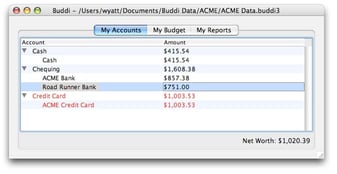
After you’ve set up your accounts, next comes the actual budgeting. Buddi makes it easy for you to tailor budgets to your unique needs — you can use default categories like salary, auto, entertainment, groceries and so on, or you could create your own custom budgets. This is especially helpful if you have unusual income/expenses that come with things like freelance payments or court-ordered judgments.
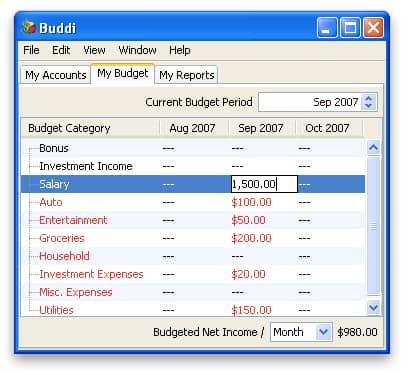
“Some people use very fine divisions and have a separate category for each of phone, heating, electric and water utilities. Others will just lump it all together under utilities,” Olson said. “Which way you decide to categorize your expenses is up to you.”
Using Automatic Reports to Analyze Your Transactions
Buddi’s best features really start to shine after you spend time actively tracking and cataloging your expenses.
Whenever you complete a new transaction, you’re able to select which account or budget categories the transaction moves between. For example, if you used a credit card for $150 worth of groceries, you would list the money as coming from the appropriate credit card account and going to your groceries budget.
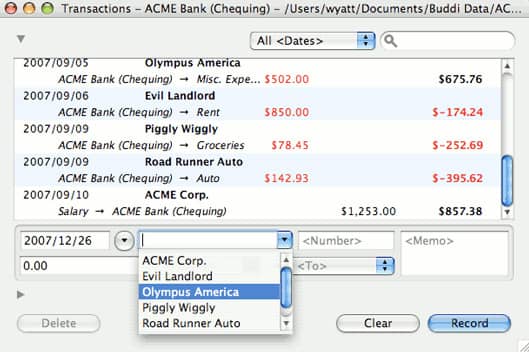
Buddi makes it easy to keep track of how your expenses and budgets interact.
This technique is reminiscent of envelope budgeting where you’ll set aside dedicated sums of money for planned expenses in envelopes. The only difference here is it’s all done on a computer.
Olson also added a feature that allows you to split single transactions into multiple budgets — “i.e. buying $100 worth of goods at Walmart and allocating $50 of the expense to groceries, $25 to clothing and $25 to entertainment.”
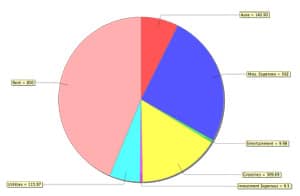 Once you’ve completed a month’s worth of transactions, you’ll want to check out Buddi’s free and helpful reporting feature. You can easily make colorful pie graphs that break down where your money’s gone over a given period of time (anywhere from the past week to the past year).
Once you’ve completed a month’s worth of transactions, you’ll want to check out Buddi’s free and helpful reporting feature. You can easily make colorful pie graphs that break down where your money’s gone over a given period of time (anywhere from the past week to the past year).
Buddi also can develop tables that compare your budget to how much you actually spent, helping you track whether you’ve stayed under or gone over budget.
Conclusion
“The two biggest advantages of Buddi are the simplicity and cost,” Olson said. “Most other budgeting programs (or programs in general, for that matter) try to be everything to everybody, whereas Buddi focuses on just the essentials. Add the cost (free, with donations of any amount gratefully accepted), and in my mind it makes sense to at least see if Buddi meets your needs before shelling out cash for an alternative.”
“The two biggest advantages of Buddi are the simplicity and cost… [It] focuses on just the essentials.”
Since its inception, Buddi’s active community of supports have translated it into 17 different languages and used it for a variety of university projects. The software continues to receive helpful third party plugins as it nears its millionth download.
But despite its widespread appeal, Olson admits Buddi is not for everyone, particularly people working with investments, multiple currencies or other complex financial scenarios.
“If, though, you are an average ‘working Joe’ like myself, with a few bank accounts, a credit card, maybe a line of credit, and just want to keep track of where your hard earned money goes, Buddi may well be the answer.”
Advertiser Disclosure
BadCredit.org is a free online resource that offers valuable content and comparison services to users. To keep this resource 100% free for users, we receive advertising compensation from the financial products listed on this page. Along with key review factors, this compensation may impact how and where products appear on the page (including, for example, the order in which they appear). BadCredit.org does not include listings for all financial products.
Our Editorial Review Policy
Our site is committed to publishing independent, accurate content guided by strict editorial guidelines. Before articles and reviews are published on our site, they undergo a thorough review process performed by a team of independent editors and subject-matter experts to ensure the content’s accuracy, timeliness, and impartiality. Our editorial team is separate and independent of our site’s advertisers, and the opinions they express on our site are their own. To read more about our team members and their editorial backgrounds, please visit our site’s About page.




